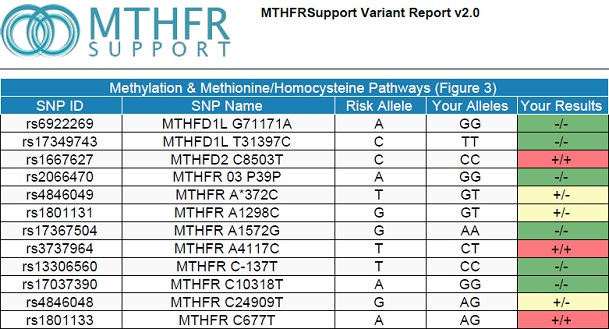

What Is Methylation?
Methylation is simply the attachment of a methyl group (single carbon, three hydrogen) to another molecule. Although simple, methylation is a critical process for building, maintaining and repairing cells and tissues throughout the body.
Why Is Methylation Important?
Methylation has many important functions within our bodies, including:
- turning gene function on and off as needed1
- protecting otherwise fragile DNA2,3,4
- recycling neurotransmitters, such as serotonin, melatonin and epinephrine
- building our basic immune cells, including natural killer cells5
- maintaining the protective coating on nerve cells (myelin)6
How Is Methylation Interrupted?
Methylation can be interrupted by a few common issues:
- lack of required nutrient cofactors (folate, zinc, vitamin B2, B6, B12, magnesium or cysteine)
- environmental toxicity from heavy metals7
- certain drugs including alcohol8, nitrous oxide9 and antacids10 (proton pump inhibitors)
- genetic mutations/polymorphisms (SNPs) of specific genes (MTHFR, GSTM1, PEMT, MAT, GAMT, CBS)
When Methylation Goes Wrong

A single nucleotide polymorphism (SNP) of the MTHFR gene is a common cause of methylation issues. People who have MTHFR SNPs are more likely to suffer a number of health conditions, including: autism11, cognitive decline12, depression, bipolar disorder, schizophrenia13, diabetes14,15, down syndrome16,17, essential hypertension18, gastric cancer19, ischemic stroke20, migraine21, neural tube defects22 and smoking addiction23.
As can be seen from the number of body systems affected, methylation is a universal process of regulation. When methylation is not functionally properly many processes within the body can falter, leading to disease.
The MTHFR Gene
The MTHFR gene is responsible for producing the methylene tetrahydrofolate reductase (MTHFR) enzyme. The MTHFR enzyme controls the rate limiting step of the methylation cycle. Methylation throughout the body will be inhibited if the concentration of MTHFR enzyme is below optimal levels.
What Is A Single Nucleotide Polymorphism (SNP)?
A single nucleotide polymorphism (SNP) is a fancy name for an error in DNA copying. This error can lead to downstream negative effects, typically a lower than optimal amount of the protein or enzyme which the affected gene is in control of producing.
MTHFR Problems (SNPs) Are Common
MTHFR SNPs are common throughout the world. A large study of 37,000 people found that 85% of people examined had SNPs affecting their MTHFR gene24. So it is not 1/100 or 1/10 people who have MTHFR SNPS, it is closer to 8/10 or 9/10!
Where Can I Get Tested For Methylation Issues?

Below is a list of labs which test for MTHFR single nucleotide polymorphisms (SNPs):
- Genova Diagnostics
- Doctor’s Data
- Spectracell Laboratories
- 23andme
The results which come back from a genetic test can be extensive, to say the least. The results help to shed light on problem areas and health risk factors based on the individual’s genetic make-up. The data can be difficult to interpret unless the person running the test has a working knowledge of the genes being tested.
Fixing Methylation Problems
Depending on the cause of the methylation issue (lack of cofactors, environmental toxins, genetic polymorphisms, side effects of medications) the best possible treatment may involve providing more substrate (activated methyl folate, methylated vitamin B12, etc.), eliminating environmental toxins and/or making changes to current medications being taken. In some cases an overlapping pathway must be supported in order to optimize methylation.
Further Uses Of Genetic Testing
Although MTHFR gene SNPs (copying errors) are quite common, there are other important genes which can be affected by SNPs too. Genetic testing can also identify SNPs in other genes which can cause problems, such as sluggish liver function or neurotransmitter imbalances.
Methylation Testing In Halifax, Nova Scotia
If you are interested in having genetic testing done and are located in the Halifax area, please contact MacLeod Naturopathic to book an initial naturopathic visit to discuss your options. Dr. MacLeod has completed formal training with Dr. Ben Lynch ND, an expert in the field of methylation.
References
- Razin A, Cedar H. DNA methylation and gene expression. Microbiol Rev. 1991 Sep;55(3):451-8.
- Kisseljova NP, Zueva ES, Pevzner VS, Grachev AN, Kisseljov FL. De novo methylation of selective CpG dinucleotide clusters in transformed cells mediated by an activated N-ras. Int J Oncol. 1998 Jan;12(1):203-9.
- Vasu K, Nagaraja V. Diverse functions of restriction-modification systems in addition to cellular defense. Microbiol Mol Biol Rev. 2013 Mar;77(1):53-72.
- Zilberman D. The evolving functions of DNA methylation. Curr Opin Plant Biol. 2008 Oct;11(5):554-9.
- Dobenecker MW, Kim JK, Marcello J, Fang TC, Prinjha R, Bosselut R, Tarakhovsky A. Coupling of T cell receptor specificity to natural killer T cell development by bivalent histone H3 methylation. J Exp Med. 2015 Mar 9;212(3):297-306.
- Kim S, Lim IK, Park GH, Paik WK. Biological methylation of myelin basic protein: enzymology and biological significance. Int J Biochem Cell Biol. 1997 May;29(5):743-51.
- Senut MC, Sen A, Cingolani P, Shaik A, Land SJ, Ruden DM. Lead exposure disrupts global DNA methylation in human embryonic stem cells and alters their neuronal differentiation. Toxicol Sci. 2014 May;139(1):142-61.
- Ross S, Poirier L. Proceedings of the Trans-HHS Workshop: Diet, DNA Methylation Processes and Health. J. Nutr. August 1, 2002 vol. 132 no. 8 2329S-2332S.
- Yagiela JA. Health hazards and nitrous oxide: a time for reappraisal. Anesth Prog. 1991 Jan-Feb;38(1):1-11.
- Lam JR, Schneider JL, Zhao W, Corley DA. Proton pump inhibitor and histamine 2 receptor antagonist use and vitamin B12 deficiency. JAMA. 2013 Dec 11;310(22):2435-42.
- Pu D, Shen Y, Wu J. Association between MTHFR gene polymorphisms and the risk of autism spectrum disorders: a meta-analysis. Autism Res. 2013 Oct;6(5):384-92.
- Rajagopalan P1, Jahanshad N, Stein JL, Hua X, Madsen SK, Kohannim O, Hibar DP, Toga AW, Jack CR Jr, Saykin AJ, Green RC, Weiner MW, Bis JC, Kuller LH, Riverol M, Becker JT, Lopez OL, Thompson PM. Common folate gene variant, MTHFR C677T, is associated with brain structure in two independent cohorts of people with mild cognitive impairment. Alzheimer’s Disease Neuroimaging Initiative (ADNI); Cardiovascular Health Study (CHS). Neuroimage Clin. 2012 Oct 4;1(1):179-87.
- Peerbooms OL, van Os J, Drukker M, Kenis G, Hoogveld L. MTHFR in Psychiatry Group, de Hert M, Delespaul P, van Winkel R, Rutten BP. Meta-analysis of MTHFR gene variants in schizophrenia, bipolar disorder and unipolar depressive disorder: evidence for a common genetic vulnerability?. Brain Behav Immun. 2011 Nov;25(8):1530-43.
- AbdRaboha N, Badrb S, Alic S. Prevalence of methylenetetrahydrofolate reductase C677T and A1298C polymorphisms in Egyptian patients with type 2 diabetes mellitus. Egyptian Journal of Medical Human Genetics. Jan 2013;14(1):87–93.
- Wang H, Hu C, Xiao SH, Wan B. Association of tagging SNPs in the MTHFR gene with risk of type 2 diabetes mellitus and serum homocysteine levels in a Chinese population. Dis Markers. 2014;2014:725731.
- Rai V, Yadav U, Kumar P, Yadav SK, Mishra OP. Maternal methylenetetrahydrofolate reductase C677T polymorphism and down syndrome risk: a meta-analysis from 34 studies. PLoS One. 2014 Sep 29;9(9):e108552.
- Victorino DB, Godoy MF, Goloni-Bertollo EM, Pavarino EC. Meta-analysis of Methylenetetrahydrofolate reductase maternal gene in Down syndrome: increased susceptibility in women carriers of the MTHFR 677T allele. Mol Biol Rep. 2014 Aug;41(8):5491-504.
- Wu YL, Hu CY, Lu SS, Gong FF, Feng F, Qian ZZ, Ding XX, Yang HY, Sun YH. Association between methylenetetrahydrofolate reductase (MTHFR) C677T/A1298C polymorphisms and essential hypertension: a systematic review and meta-analysis. Metabolism. 2014 Dec;63(12):1503-11.
- Xia LZ, Liu Y, Xu XZ, Jiang PC, Ma G, Bu XF, Zhang YJ, Yu F, Xu KS, Li H. Methylenetetrahydrofolate reductase C677T and A1298C polymorphisms and gastric cancer susceptibility. World J Gastroenterol. 2014 Aug 28;20(32):11429-38.
- Zhou BS, Bu GY, Li M, Chang BG, Zhou YP. Tagging SNPs in the MTHFR gene and risk of ischemic stroke in a Chinese population. Int J Mol Sci. 2014 May 20;15(5):8931-40.
- Liu R, Geng P, Ma M, Yu S, Yang M, He M, Dong Z, Zhang W. MTHFR C677T polymorphism and migraine risk: a meta-analysis. J Neurol Sci. 2014 Jan 15;336(1-2):68-73.
- Christensen B, Arbour L, Tran P, Leclerc D, Sabbaghian N, Platt R, Gilfix BM, Rosenblatt DS, Gravel RA, Forbes P, Rozen R. Genetic polymorphisms in methylenetetrahydrofolate reductase and methionine synthase, folate levels in red blood cells, and risk of neural tube defects. Am J Med Genet. 1999 May 21;84(2):151-7.
- Linnebank M, Moskau S, Semmler A, Hoefgen B, Bopp G, Kallweit U, Maier W, Schütz CG, Wüllner U. A possible genetic link between MTHFR genotype and smoking behavior. PLoS One. 2012;7(12):e53322.
- MTHFR. SNPedia, 6 Aug. 2014. Web. 16 June 2015.


